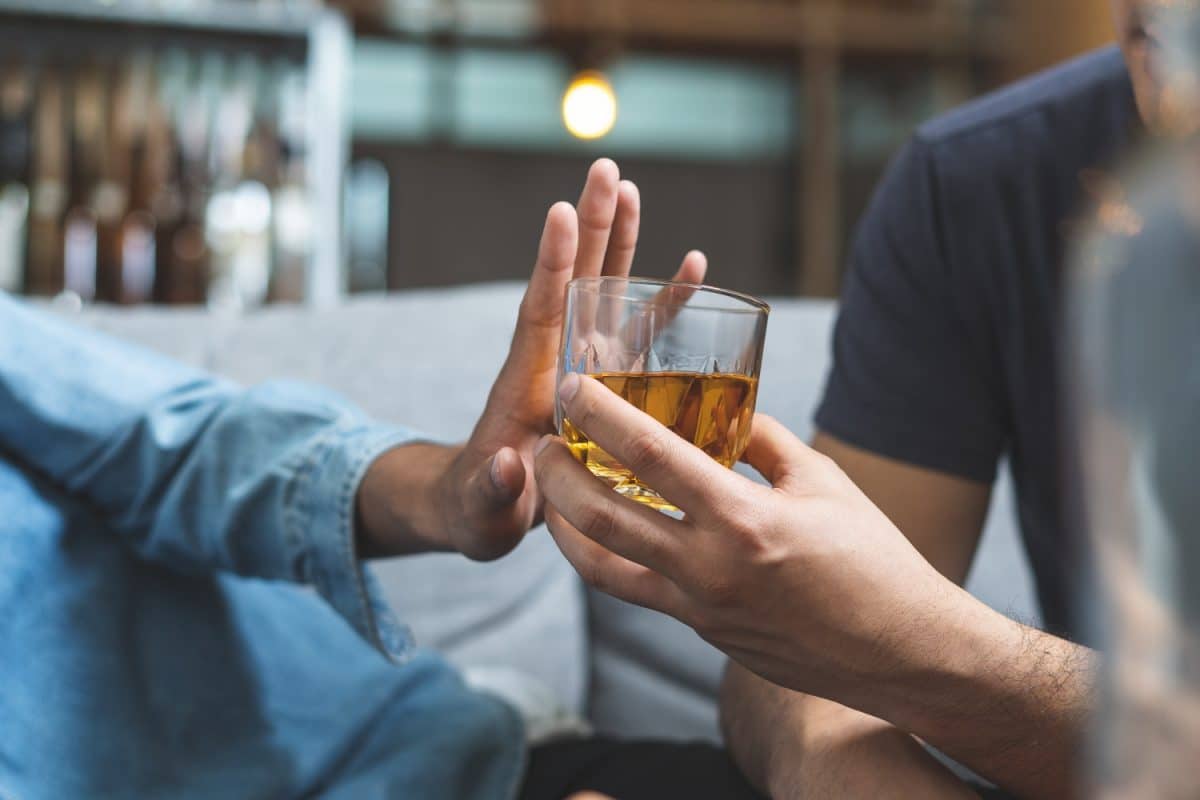An article by Renee W.
I remember my first sober holiday season. It was intense. I dreaded holiday get-togethers where others sat around, happily sipping their wine and beer. I would walk into a party, the walls and tables sparkling with hues of green and red, and I would start sweating uncontrollably. People were mingling, laughing with each other, drinking their alcohol like it was just another day. And for them, it was.
I tiptoed around, avoiding the drinks, but indulging in the sweets, while sipping my water. I felt so alone. I felt like no one cared how hard it was for me to be there.
I resented the people who’d invited me.
I resented everyone there.
I resented myself for not being “normal”.
I counted down the minutes until I could leave.
The holiday season is supposed to be a fun time of celebration. Fair enough. But if you’re a recovering addict or alcoholic, it can be the most miserable time of your year.
You can feel like you’re barely holding onto your sobriety and that no one is helping. You can feel unbearably alone.
But you don’t have to feel those things. You, like me, can learn how to thrive during the holiday season.
What’s the secret, you ask?
Be selfish.
Let me explain…
Be selfish by putting your needs first.
It’s natural to want to please others. It used to be that if I was invited to a holiday party, I didn’t want to disappoint the host by declining. However, I have learned the hard way that if I know that going to a party with alcohol will trigger me and I still go, I have a bigger problem on my hands.
I learned how to be selfish with my needs. If I’m not comfortable around certain people, places, or activities, then I don’t go. I no longer care whether someone else is offended that I didn’t show up. I do what’s best for me and my recovery, and if that means politely declining an invitation, then that’s what happens.
So that’s my first tip for thriving during the holiday season as a recovering addict: Don’t go somewhere that you know will be triggering.
Here are some more tips:
Plan and prepare
Let’s say that you have weighed the pros and cons of attending a particular holiday party, and you have decided to go. Now is the time to plan ahead. Planning ahead is crucial in safeguarding your recovery.
Here are some ways to do that:
1. Set boundaries

Boundaries are the buzzword in mental health these days, and for good reason. In recovery, we absolutely need to establish our boundaries early on. What will we tolerate? What we will not tolerate?
Communicate your boundaries to your family and friends regarding events and situations that may trigger cravings or emotional discomfort. When I first did this, it felt awkward. I felt like they didn’t understand, and that I was being a high-maintenance person.
The truth is, you know what you can handle, just like I know what I can handle. If it’s early in your recovery and you’re not comfortable going to a certain restaurant that sells a certain alcoholic drink, then set your boundaries and don’t go. You won’t regret protecting yourself.
2. Create a support system
If you don’t have a support system, now’s the time to create one. If you feel like you don’t have family support, then find others in recovery. If your friends aren’t supportive, then find new friends.
Twelve-step meetings are a great place to find support systems. Most of my friends these days are people that I’ve met through Alcoholics Anonymous. I have their phone numbers saved in my phone and lean on these people regularly.
3. Have an exit plan (always!)
This is one of my best tips for thriving during the holidays as a recovering addict. Before attending an event, devise a strategy for if you start feeling uncomfortable or triggered. Simply knowing that you can leave whenever you want to can alleviate anxiety and empower you.
I have left plenty of events where I felt uncomfortable. I did not feel bad about it. After the third or fourth party where I prematurely left, I felt my confidence build. Think about it this way: social events are optional. They are supposed to be fun. You don’t HAVE to socialise if you aren’t feeling it.
Practice self-care
Self-care is another buzzword in the mental health realm, and it doesn’t have to mean cucumber facials and extravagant massages. Self-care is simply taking care of your physical, mental, and emotional needs. What does that look like? Well, it differs for everyone.
My self-care involves giving myself downtime to connect with myself and write. Exercise is also a key part of my self-care. I feel better when I get my heart rate up, especially when I’m walking or running outside.
Here are some ways you can prioritise self-care during the holidays:
1. Manage your stress in healthy ways
The stress of the holidays is felt by most. However, couple that with the stress of being in recovery. Stress is inevitable, so learn to manage your stress in healthy ways.
2. Prioritise rest and nutrition

Rest and healthy nutrition, especially in recovery, contribute significantly to mental and physical health. Stick to a routine that prioritises your health, even amid festivities.
3. Engage in mindfulness
Practising mindfulness through meditation, yoga, or deep breathing can help manage stress. These activities ground you in the present moment and help you make better decisions.
4. Exercise regularly
Plenty of research is available on the positive effects of exercise on your mind. Physical exercise not only boosts your mood but also helps you manage stress. Incorporate regular exercise into your routine, starting slowly and then adding more as you feel more confident.
Coping with triggers and temptations
Triggers and temptations are sure to come in recovery. I remember walking through the grocery store during the holiday season, and simply seeing the wine and spirits display would send me into a panic. I spent a lot of time in the grocery store’s bathroom trying to get myself together.
First, understand that triggers are a part of recovery—they are inevitable. So, what do you do when you are triggered or tempted to drink or use?
Here are some coping strategies:
1. Have multiple accountability partners

Don’t just stick to one person to keep you accountable. What if you need to talk to someone right now, and that one person isn’t answering their phone? You call someone else. Having a handful of people to call when you need to talk can help deflect uncomfortable situations and give you accountability and encouragement.
2. Practise mindful responses
Prepare responses in advance for declining offers of alcohol or drugs. Politely but firmly decline, using phrases that assert your commitment to sobriety. When I first got sober, I had a hard time with this. I would make excuses such as “No, thank you. I have to get up early tomorrow.” Now I just say, “No thank you—I don’t drink.” There’s no need to explain yourself.
3. Focus on what you’re grateful for
Redirect your focus by reflecting on the positive aspects of your recovery journey and the things you’re grateful for in your life. Sometimes, a simple mindset shift is all it takes to combat triggers. If I’m feeling sorry for myself, that feeling is naturally a trigger. I have learned to say, “I’m grateful for my life today because I’m sober and I actually have everything I’ve ever wanted out of life.”
Embrace alternative celebrations
Another tip I have for you is to redefine what holiday celebrations mean to you. Reimagining the holiday experience can be empowering:
1. Volunteer and give back

One of my first sober Thanksgivings I volunteered at a food bank in my community. It was the most fulfilling experience and diverted my attention from potential triggers. Spend some time planning ways that you can volunteer in your community during the holiday season.
2. Create new traditions
Establish new, meaningful traditions that align with your recovery goals. I know people in recovery who enjoy going on long hikes during the holidays. You could sign up for a painting or pottery class. Think of something that you enjoy doing and see how you can incorporate it into your life this holiday season.
3. Channel creativity
There’s something so magical about creating something new. A few holiday seasons ago, my mother-in-law and I created Christmas crafts and gave them as gifts. It was a meaningful experience to give something handmade. Creative outlets can serve as therapy to help navigate emotions and stress.
Seek professional help if needed

If you’re overwhelmed with navigating this holiday season without alcohol or drugs, it’s time to seek professional help without hesitation. Therapists, counsellors, or addiction specialists can offer tailored support through this challenging period. Ask for help when you need it. No one should feel as though they are alone in recovery.
Reflect and celebrate
As the holiday season winds down, take time to reflect on your achievements. Celebrate ALL your victories–nothing is too small. If you were triggered and wanted to use substances, but then called someone to help, then you won! Acknowledge the strength it took to maintain your sobriety during this holiday season.
This is my fourth consecutive sober holiday season, and I’m nowhere near as frazzled as I was four years ago. However, I still keep all my recovery tools close by.
If I am uncomfortable at a holiday get-together, I just leave.
I stay close to my support group.
I practise self-care every day by writing and exercising.
I understand how hard it was for me to get this far, and I protect my sobriety at all costs. You can too.
How can White River Manor help?
Thriving during the holiday season as a recovering addict involves proactive planning, maintaining your self-care routines, and a commitment to sobriety.
White River Manor Recovery understands how difficult recovery can be, and we are here to help. If you or a loved one are seeking help for addiction, take that first step with us.
We offer a compassionate, customised approach to addiction recovery, offering evidence-based therapy designed to guide our clients toward a life of sobriety.
Contact us today to explore our personalised treatment plans and supportive community. You deserve sobriety, and we are here to help you get there.







